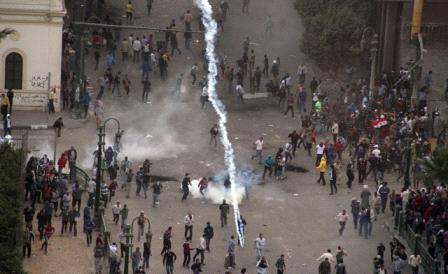Ammon News - By Al Arabiya / agencies
Egypt’s ruling Freedom and Justice Party (FJP) denied on Friday that President Mursi would retract a recent constitutional declaration granting him sweeping powers.
In an interview with Al Arabiya, the FJP’s Vice Chairman Essam al-Erian said that the president will not retract the declaration, and that it “will remain until the constitution is ratified during the coming days.”
Al-Erian’s announcement comes as opponents of President Mursi began a one-week sit-in protest in Cairo’s Tahrir Square Friday night to demand the Islamist leader retract his declaration.
“All revolutionary political forces have agreed to begin a sit-in starting Friday,” the Popular Current led by former presidential candidate Hamdeen Sabbahi said in a statement, calling for a mass protest on Tuesday.
So far, 26 political movements and parties have agreed to take part in the sit-in, organizers told AFP.
Supporters to the president’s recent constitutional declaration say the move will cut back a turbulent and seemingly endless transition to democracy, but outraged critics say he has now become a dictator.
Standing before a large number of fellow Islamists outside the presidential palace on Friday, Mursi insisted that Egypt is on the path to “freedom and democracy.”
“Political stability, social stability and economic stability are what I want and that is what I am working for,” Mursi said.
However, Mursi’s speech did not convince thousands of his opponents in Tahrir Sqaure, who decided to begin a one-week sit-in in the Square and called for a mass protest on Tuesday.
The president’s opponents poured into Tahrir after Muslim Friday prayers, joined by leading secular politicians Mohamed ElBaradei, a former U.N. nuclear watchdog chief, and Amr Mussa, an ex-foreign minister and Arab League chief.
Clashes erupted between police and protesters near the square, with demonstrators setting fire to a police truck, witnesses told AFP.
Also, violent confrontations erupted on the day between Mursi supporters and foes in the canal city of Suez and the Mediterranean city of Alexandria, where protesters ransacked the offices of the Muslim Brotherhood, from which the president was elected in June.
In the same vain, a number of Mursi’s advisors started announcing their resignations on Friday over the president’s recent decisions, reported Al Arabiya.
Samir Morcos, a member of the president’s advisory team, described the recent decrees to be “undemocratic and a leap backwards,” reported Al Ahram.
Under a declaration read out on television on Thursday, the president “can issue any decision or measure to protect the revolution... The constitutional declarations, decisions and laws issued by the president are final and not subject to appeal.”
The move is seen by many a blow to the pro-democracy movement that ousted Mubarak, and sparked fears that Islamists will be further ensconced in power.
It also raised international concerns, with the United States calling for calm and urging all parties to work together.
“The decisions and declarations announced on November 22 raise concerns for many Egyptians and for the international community,” said State Department spokeswoman Victoria Nuland.
“One of the aspirations of the revolution was to ensure that power would not be overly concentrated in the hands of any one person or institution,” her statement added.
In Brussels, a spokesman for EU foreign policy chief Catherine Ashton said “it is of utmost importance that the democratic process be completed in accordance with the commitments undertaken by the Egyptian leadership.”
Rights watchdog Amnesty International slammed Mursi’s new powers, which “trample the rule of law and herald a new era of repression.”
On Thursday, Mursi undercut a hostile judiciary which had been considering whether to scrap an Islamist-dominated panel drawing up a new constitution and stripped judges of the right to rule on the case or to challenge his decrees.
The decision effectively places the president above judicial oversight until a new constitution is ratified.
